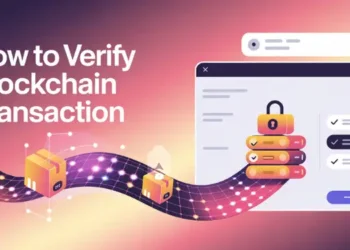Did you know 94% of Fortune 500 companies are looking into blockchain technology? It’s not just for crypto fans anymore.
I remember my first blockchain workshop in 2015. Twenty confused faces looked at my diagram. Now, those workshops are packed because people want to learn.
“The biggest problem with blockchain isn’t the tech—it’s finding people who can make it useful,” says Vitalik Buterin, Ethereum’s founder.
You’re joining at a great time. As more companies share data online, blockchain’s security is key. The industry needs people who can connect tech skills with real uses.
This guide will help you start a career in blockchain. It’s for beginners or those moving from other tech jobs. No computer science degree needed.
- Discover diverse blockchain career paths beyond development
- Learn essential skills that employers actually value
- Find educational resources that won’t waste your time
- Build a portfolio that showcases your understanding
Mapping Diverse Career Paths Available
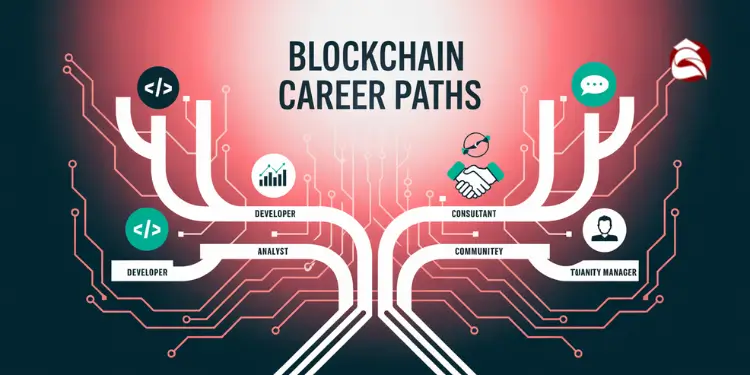
The blockchain revolution has opened up many career paths. These paths fit different talents and backgrounds. When I first taught blockchain, many thought there was only one path: becoming a developer. But, the ecosystem now supports many roles, from technical to community-focused.
Think of blockchain careers like branches on a tree. Each branch has its own challenges and rewards. Let’s look at these paths to find the best fit for you.
Enterprise uptake is accelerating: 60 % of Fortune 500 firms now run on-chain pilots or full-scale projects, signalling that blockchain is moving well beyond experimental phases.Ref.: “Canny, W. & Alpher, S. (2025). Blockchain Initiatives Have Been Adopted by 60% of Fortune 500 Companies: Coinbase Survey. CoinDesk.” [!]
“Simulate Blockchain Locally: How to simulate blockchain a simple DIY demonstration“
Developer Analyst Consultant Community Manager
The blockchain developer path has two main tracks. Core developers create the blockchain’s foundation. They need to know a lot about cryptography and network security.
Software developers build apps and smart contracts. They make the blockchain useful for everyday use. If you like solving problems with code, this might be for you.
Analysts connect tech with business value. They look at blockchain solutions and find ways to use them. They come from finance, data science, or business backgrounds.
Consultants help companies use blockchain. They use their tech and business knowledge. This role is for those who can explain complex things simply.
Community managers focus on the people side of blockchain. They build relationships and share updates in simple terms. Good communication and a love for the tech are key here.
| Career Path | Core Skills Required | Entry Difficulty | Salary Range (USD) | Growth Potentia |
|---|---|---|---|---|
| Core Developer | C++, Go, Rust, cryptography, consensus algorithms | High | $120,000-$175,000 | Very High |
| Software Developer | Solidity, JavaScript, Web3.js, smart contract development | Medium | $90,000-$140,000 | High |
| Blockchain Analyst | Data analysis, financial modeling, research methodology | Medium | $85,000-$130,000 | Medium |
| Blockchain Consultant | Project management, business strategy, technical knowledge | Medium-High | $100,000-$160,000 | High |
| Community Manager | Communication, social media, event planning, basic technical knowledge | Low-Medium | $60,000-$110,000 | Medium |
Finding blockchain jobs is easier now. Sites like LinkedIn and Glassdoor list blockchain jobs. But, CryptoJobs and BlockchainJobz have unique roles too.
You don’t have to follow a straight path in blockchain. Many people started in other fields before moving to blockchain. Find what you’re good at and enjoy.
Think about which path you like best. Your skills and interests can guide you. For example, programmers might like development, while people skills are great for community management.
“Understand Blockchain Challenges: Blockchain limitations and challenges current issues and solutions“
Essential Technical Skills to Build
The blockchain world needs special skills to stand out. When I teach blockchain, students often feel lost. But, you don’t have to learn everything at once.
Start with the basics and then add more skills. This way, you can move into blockchain careers without getting too tired.
NIST warns that Proof-of-Work networks can draw more electricity than some nation-states (Bitcoin once surpassed Ireland’s annual use), so teams must balance security with energy efficiency when selecting consensus schemes.Ref.: “Yaga, D. & Mell, P. (2018). Blockchain Technology Overview (NISTIR 8202 Draft). National Institute of Standards and Technology.” [!]
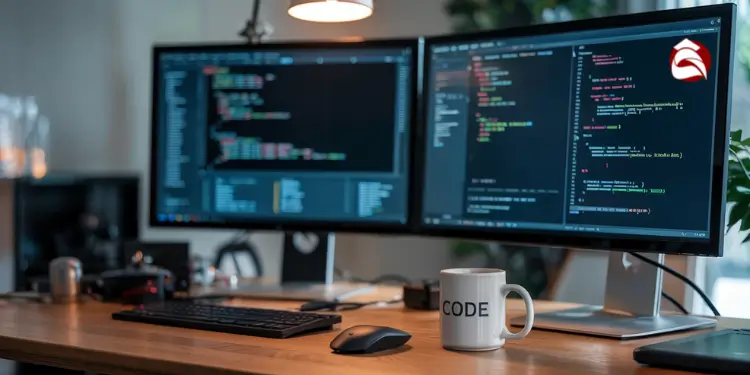
Core Development Foundations
For blockchain core development, focus on key skills. Learn programming languages like C++, Rust, and Go. These are used in Bitcoin, Polkadot, and Ethereum.
Next, learn computer science basics. Knowing data structures and algorithms is key. Also, you must understand cryptography, which keeps blockchains safe.
Teaching blockchain from scratch, I stress the importance of knowing distributed systems. Learn about consensus algorithms and peer-to-peer networking. This will set you apart from other developers.
The best blockchain developers I’ve trained didn’t try to learn everything at once. They built skills systematically, mastering one concept before moving to the next.
Software Development Skills
For blockchain software development, your skills are different. Learn frontend development with React.js, Angular, or Vue.js. This makes blockchain apps easy to use.
Start with smart contract development. Learning Solidity or Vyper is practical. A good tutorial teaches you about security in immutable code.
Because deployed smart contracts are immutable, industry guidance recommends at least one comprehensive security audit prior to main-net release to avoid non-reversible flaws and fund losses.Ref.: “Parisi, C. & Budorin, D. (2023). Smart Contract Security. Springer.” [!]
Backend development skills are also important. Use Node.js, Python, or Java to connect databases with blockchains. Knowing Web3.js, Ether.js, or Web3.py lets your apps talk to blockchains.
| Skill Category | Beginner Level | Intermediate Level | Advanced Level |
|---|---|---|---|
| Programming | JavaScript basics, Python fundamentals | Solidity, one core language (C++/Rust/Go) | Multiple languages, security optimization |
| Blockchain Concepts | Basic transaction models, wallet usage | Consensus mechanisms, network architecture | Protocol design, scaling solutions |
| Development Tools | Remix IDE, Truffle basics | Hardhat, Web3 libraries, testnets | Custom tooling, mainnet deployment |
Building Your Skills Strategically
Successful blockchain pros learn in three steps. First, learn the basics through courses or tutorials. Sites like Coursera, Udemy, and YouTube are great for beginners.
Then, practice with real projects. Building something helps solidify your knowledge. Try making simple blockchain systems or smart contracts.
Specialize in areas you like. If you like making interfaces, focus on that. If security interests you, dive into cryptography.
Learning blockchain is a long journey. It’s always changing, so keep learning. Set aside time each week to learn new things and try new code.
Don’t worry if you don’t understand everything at first. Every expert was once a beginner. Celebrate your small wins and ask questions in forums.
“Explore Blockchain Applications: What is blockchain used for main applications and uses“
Recommended Educational Resources and Courses
When I started teaching blockchain in 2015, finding good learning materials was difficult. Now, there are many options. You can pick what best fits your career goals.
Old schools cannot keep up with blockchain’s rapid changes, which means new learning sites are growing quickly.
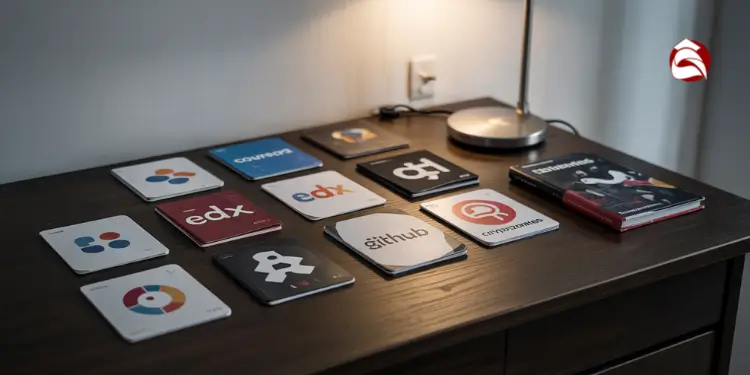
First, learn basic coding. Use JavaScript, Python, and Solidity. Then, you can dive into learning blockchain technology.
The most successful blockchain professionals I’ve mentored didn’t just accumulate certificates—they built a learning system that combined structured courses with hands-on projects and community engagement.
Here’s a list of top places for learning blockchain:
- Free Introductory Resources – Great for starting without spending money:
- Coinbase Learn – Makes hard topics easy to understand
- Binance Academy – Has detailed guides on blockchain and crypto
- YouTube channels like “Eat The Blocks” and “Dapp University” – Give step-by-step tutorials
- Structured Online Courses – Good for learning blockchain step by step:
- Coursera’s “Blockchain Specialization” by University at Buffalo – Mixes theory with practice
- Udemy’s “Blockchain A-Z” – Teaches you to make your own blockchain
- edX’s “Blockchain Fundamentals” by Berkeley – Offers deep learning with real-world use
- Industry Certifications – Adds value to your resume:
- IBM Blockchain Foundation Developer certification – Known worldwide
- Certified Blockchain Solution Architect (CBSA) – Focuses on big company use
- Blockchain Council certifications – Covers smart contracts and DeFi
For those who like to do, there are interactive sites. CryptoZombies lets you learn Solidity by making a game. It makes learning blockchain fun.
For a more set plan, here are paths based on your level:
| Experience Level | Recommended Resources | Time Investment | Expected Outcomes |
|---|---|---|---|
| Beginner | Blockchain Basics (Coursera), Cryptozombies, Binance Academy | 2-3 months | Grasp basics, start smart contract coding |
| Intermediate | Ethereum Developer Program, BlockGeeks courses, GitHub tutorials | 3-6 months | Make DApps, smart contracts, learn protocols |
| Advanced | ConsenSys Academy, Chainlink bootcamp, specialized workshops | 6+ months | Advanced DApp design, security, protocol making |
Don’t forget community sites when learning blockchain technology. Sites like Stack Exchange and Reddit’s r/ethdev help a lot. They offer support and advice.
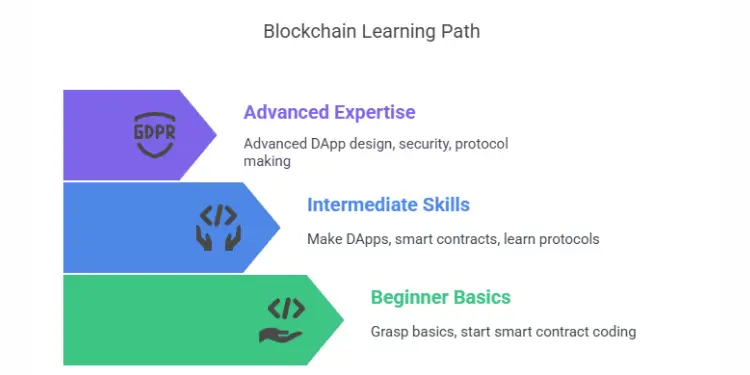
For hands-on learning, GitHub is great. Many projects have detailed guides and code. This gives you real-world practice.
Blockchain changes fast, so keep learning. Spend 3-5 hours a week to stay up-to-date. This keeps your skills sharp.
Plan your learning well. Start with a course, then do projects, and join communities. This mix helps you learn fast.
Start your blockchain learning today. Pick a beginner resource and aim to finish it in 30 days. This will kickstart your journey.
LinkedIn’s 2024 Workplace Learning Report shows 9 out of 10 global executives plan to maintain or increase upskilling budgets—evidence that continuous learning directly aligns with business impact.Ref.: “LinkedIn Learning & Research Team. (2024). Workplace Learning Report 2024. LinkedIn.” [!]
“Discover Blockchain Use Cases: Blockchain real world use cases across different industries“
Building a Compelling Blockchain Portfolio
Getting into the blockchain world? A well-made portfolio of real projects speaks volumes. I’ve helped many students get their first blockchain jobs. Employers want to see what you can do, not just your resume.
Your portfolio should show off your tech skills, problem-solving, and blockchain knowledge. It’s not just about how many projects you have. What matters most is the quality and how well they fit your career goals.
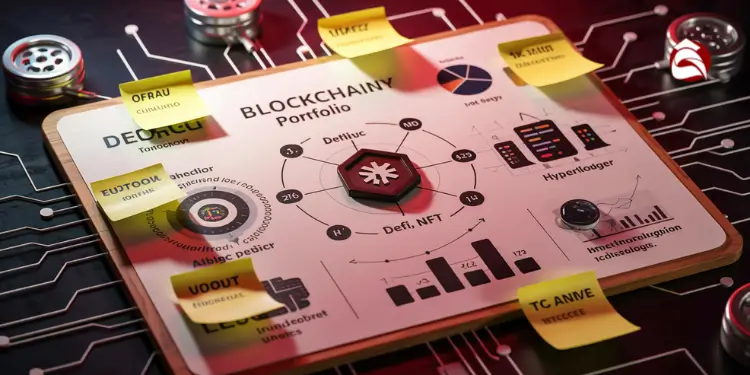
Open Source Contributions Showcase Expertise
Working on open source blockchain projects is a great way to show your skills. The blockchain community loves to work together. There are thousands of projects on GitHub that need help.
Look for projects that match your skill level. Beginners can start with small tasks. As you get better, you can take on bigger challenges.
Here’s how to make a difference in open source projects:
- Learn about the project and its goals
- Join the project’s chat groups
- Start with small tasks like fixing bugs or updating docs
- Move on to bigger tasks as you get more experience
- Show off your work in your portfolio with links to your contributions
Platforms like Ethereum, Solana, Polygon, and Hyperledger are always looking for help. Each offers a chance to learn about different parts of blockchain. Your GitHub profile shows your coding style and teamwork skills.
Linux Professional Institute’s 2024 job survey found 89 % of open-source professionals rate an employer’s contribution policy as “very important” or “essential,” making visible GitHub activity a decisive hiring differentiator.Ref.: “Rice, G. & Osborn, B. (2024). 2024 Open Source Professionals Job Survey Report. Linux Professional Institute.” [!]
“Open source contributions show you can work with others and solve problems—key skills in blockchain.”
Hackathon Projects Highlight Problem Solving
Hackathons are great for building new solutions and meeting people in the industry. They challenge you to use blockchain in new ways to solve real problems.
Here’s why hackathons are good for your portfolio:
- They give you a chance to show off complete projects
- They show you can work well under pressure
- They highlight your teamwork skills
- They offer chances to meet future employers
- They let you explore new blockchain areas
Choose hackathons that focus on areas that are growing fast. DeFi projects show you know about finance and smart contracts. NFTs and Metaverse projects show your creativity and vision.
Projects for big companies can also make your portfolio stand out. Companies like Hyperledger focus on these areas, making your projects even more valuable.
| Blockchain Field | Project Type | Skills Demonstrated | Target Companies |
|---|---|---|---|
| DeFi | Lending protocols, DEXs | Smart contracts, financial logic | Aave, Compound, Uniswap |
| NFTs | Marketplaces, collections | Token standards, metadata | OpenSea, Rarible, Foundation |
| Metaverse | Virtual worlds, assets | 3D integration, ownership | Decentraland, The Sandbox |
| Enterprise | Supply chain, identity | Permissioned networks | Hyperledger, R3, Quorum |
Write up each hackathon project in your portfolio. Share the problem, your solution, the tech you used, and what you achieved. If you won awards, highlight them. Even unfinished projects can show your skills—just be honest about their status.
Employers want problem-solvers who can keep up with blockchain’s fast pace. Your portfolio should show you’re always learning and applying blockchain. Each project proves you can build and understand blockchain solutions.
“Learn Blockchain Coding: How to learn blockchain coding beginner programming roadmap“
Networking Strategies Within Blockchain Community
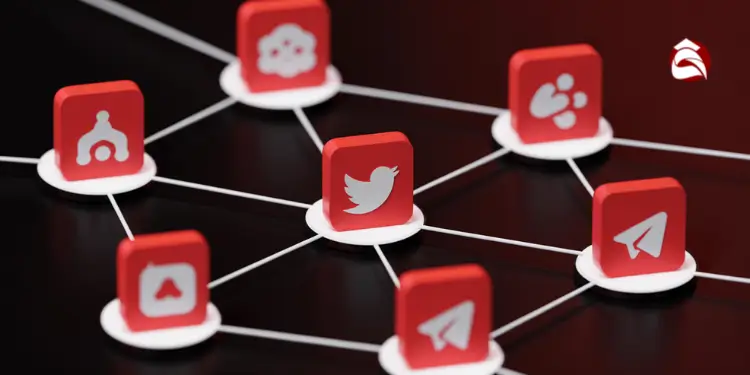
Getting a job in blockchain is all about who you know. I’ve helped many newcomers, and almost every job came from a friend. This shows how important trust and referrals are in blockchain.
Starting with no connections is okay. I used to be in your shoes. Now, I know hundreds of blockchain experts. The community welcomes newcomers who are eager to learn.
“In blockchain, your network becomes your net worth. The connections you build today might lead to your dream opportunity tomorrow.”
People with special blockchain skills are in high demand. Blockchain is growing fast, creating jobs in many fields. You should network with people in your technical area and your dream industry.
Leveraging Social Platforms and Events
The blockchain world is active on many platforms. As a beginner, you can connect with employers in these places:
- Twitter/X: Follow leaders, join Spaces, and share thoughts
- Discord: Join servers for projects and community
- GitHub: Help with open-source projects to show your skills
- LinkedIn: Connect with pros and join groups
- Telegram: Join channels for specific platforms
Don’t miss out on in-person events. They help you make strong connections. Here’s how to make the most of blockchain events:
- Learn about speakers and attendees before you go
- Have a quick intro about your blockchain interests
- Ask smart questions during sessions
- Send a personalized message within 48 hours
- Give before you ask for help
At your first event, focus on learning. This way, you can learn and make real connections. Everyone starts somewhere in this fast-changing field.
| Networking Channel | Best For | Engagement Strategy | Success Metrics |
|---|---|---|---|
| Hackathons | Hands-on blockchain programming experience | Join teams, showcase problem-solving skills | Projects completed, GitHub contributions |
| Industry Conferences | Meeting established professionals | Prepare questions, attend workshops | Quality conversations, follow-up meetings |
| Online Forums | Technical discussions, blockchain tutorial helps | Answer questions, share resources | Reputation score, meaningful exchanges |
| Local Meetups | Building local blockchain network | Regular attendance, volunteer to help | Recognition within community, referrals |
For beginners, join community-led projects. Many platforms have ambassador programs. These offer mentorship and ways to contribute while growing your network.
When reaching out to pros, show you’ve done your homework. Mention their work or articles. Generic messages get ignored, but thoughtful ones often get a response.
Networking in blockchain is about giving back. You can help by sharing new ideas, connections, or promoting others’ work. The best networkers focus on helping others first.
“Explore Blockchain:
Navigating Job Search and Interviews
Finding your first blockchain job needs careful planning. I’ve found which steps lead to job offers in this field. This guide will help you understand how to find blockchain jobs.
Look for companies that actually use blockchain, not just talk about it. Websites like CryptoJobs, Cryptocurrency Jobs, and BlockchainJobz have jobs you won’t find elsewhere.
Your resume should show how your skills fit blockchain jobs. Tailor each application to highlight your relevant experience. The U.S. Bureau of Labor Statistics says blockchain jobs are growing fast.
In interviews, employers check your tech skills and problem-solving. Knowing about blockchain helps answer common questions. Be ready to share how you solved tough problems.
Salaries for blockchain jobs vary a lot. Know what you can expect to earn before you start talking money. Beginners usually make $70,000-$90,000, while experts can earn over $120,000.
Don’t get discouraged by rejections when you’re starting. Each interview helps you learn what employers want. Keep getting better and learning, and you’ll stand out in this fast-changing field.












